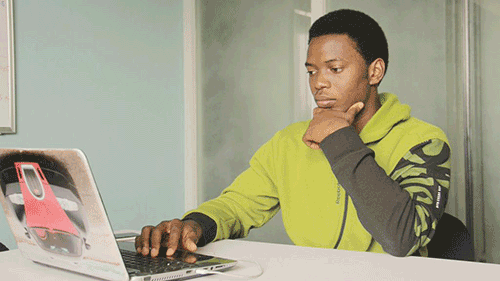Ever heard of Anzisha Prize for Young Entrepreneurs? That is a $75,000 prize money for entrepreneurial youths thinking outside the business box. It is a handy amount to launch the next level of a business start up.
The finalists
An official release by the organisers said 12 finalists have been shortlisted, seven males and five females, who have started ventures in a diverse range of economic sectors, including energy, health care, tourism, and hospitality.
They are:
Chukwuwezam Obanor, 22, (Nigeria). An electrical/electronics student at the University of Lagos, who founded Prepclass, an online platform that provides study content (past tests, answers et cetera) for students preparing for school entrance examinations.
Sam Kodo, 22, (Togo). Founder of LC-COM (Low cost-Computer)/Infinite Loop. He started designing robots at the age of eight and now runs an IT hardware company that assembles low cost computers he sells to students.
Kodo has six employees and plans to expand to the rest of the country and neighbouring countries like Nigeria, a big market where every business seeks to secure market share.
Gabriel Kombassere, 17, (Cote d’Ivoire). Founder of Rible Neda, a farming association geared towards eradicating poverty in his community.
The association produces 20 bags of maize and one cargo of cassava per year, feeding its 30 members and their families.
Chinenye Onu, 19, (Ghana). Founder of Mosaicpiration Project which uses recycled material to create art. He also impacts entrepreneurial skills to young people through training and mentorship.
Thato Kgatlhanye, 21, (South Africa). Founder of Repurpose Schoolbags, which designs school bags made from cycled plastic shopping bags.
The bags integrate solar technology, charging up during the day and transforming into light for learners to study after dark.
For a continent largely locked in electricity blackout, the innovation puts students in better stead, especially those in rural areas where electricity hardly exits.
Benedicte Mundele, 20 (Democratic Republic of Congo). Founder of Surprise Tropical, an organic local produce canteen promoting a healthy lifestyle in her community.
Noah Walakira, 21, (Uganda). Founder of Namirembe Sweater Makers, a community based organisation that supplies school uniform sweaters to over 40 schools across the country.
Nteff Alain, 22, (Cameroon). Founder of Gifted Mom Project, an e-content platform for pregnant women to combat high mother and infancy deaths.
Winifred Selby, 19, (Ghana). Founder of Ghana Bamboo Bikes Initiative, a bamboo bike making technology for producing affordable multi-purpose bikes suitable for the Ghanaian terrain.
Tom Osborn, 18, (Kenya). Founder of Greenchar, a clean energy project that produces smokeless charcoal briquettes and distributes clean cook stoves throughout Kenya.
Martha Chumo, 19, (Kenya). Founder of Nairobi Developer School which provides the youth with computer programming knowledge and skills to build solutions using technology.
Jeffrey Mulaudzi, 22, (South Africa). Founder of Mulaudzi Bicycle Tours, a lifestyle tour in Alexandra township that engages members of the community by telling their stories and involving them in the business, creating a socio-economic transformation.
Impressive entries
The finalists impressed the organisers with ventures in a diverse range of economic sectors.
The organisers expressed delight that, for the first time, finalists from Togo and Cote d’Ivoire showed strong growth in entrepreneurship activity among youths in West Africa.
The finalists will be flown to Johannesburg, South Africa for the 2014 Anzisha Week holding from September 18 to 25. A panel of judges from across the entrepreneurial sphere will select the grand prize winners on September 23.
The winners will receive training from African Leadership Academy (ALA’s) renowned Entrepreneurial Leadership faculty and engage with industry leaders, mentors as well as engage with change agents from across the continent.
Established through multi-year partnership between the African Leadership Academy’s Centre for Entrepreneurial Leadership and The MasterCard Foundation, the Anzisha Prize seeks to catalyse innovation and promote strong growth in entrepreneurship activity among youths on the continent.
Every year, organisers scour the continent for entrepreneurial youth between the ages of 15 and 22, who have identified opportunities to better their communities and done so inclusively.
“We are excited to see such a talented cohort of innovative and entrepreneurial young people join the Anzisha prize community,” said Deepali Khanna, Director of Youth Learning at The MasterCard Foundation.
“This Pan-African prize has had tremendous success over the past four years and is inspiring other young entrepreneurs across Africa to develop their own businesses or social innovation ventures.”
Now in its fourth year, the Anzisha Prize received 339 applications this year from 32 countries for Africa’s premier youth entrepreneurship award.
“2014 has been an exciting one for the Anzisha Prize search team. We brokered partnerships with key local organisations enabling them to play a primary role in evangelising the Anzisha Prize in their country.
“This has led to not only a stronger pool of applications but also more female applicants than ever before,” explained Chi Achebe, Anzisha Prize Programme Manager, Anzisha Prize.
Objective of ALA
ALA seeks to transform Africa by developing a powerful network of entrepreneurial leaders who will work together to achieve extraordinary social impact.
Each year, it brings together the most promising young leaders from all 54 African nations for a pre-university programme in South Africa with a focus on leadership, entrepreneurship, and African studies.
ALA continues to cultivate these leaders throughout their lives, in university and beyond, by providing on-going leadership and entrepreneurial training and connecting them to high-impact networks of people and capital that can catalyse large-scale change.
Support from $9b MasterCard Foundation
The MasterCard Foundation is an independent, global organisation based in Toronto, Canada, with more than $9 billion in assets. Through collaboration with partner organisations in 49 countries, it is creating opportunities for all people to learn and prosper.
The Foundation’s programmes promote financial inclusion and advance youth learning, mostly in Africa.
Established in 2006 through MasterCard Worldwide when it became a public company, the Foundation is a separate and independent entity.
The policies, operations, and funding decisions of the Foundation are determined by its own board of directors and president/chief executive officer.













